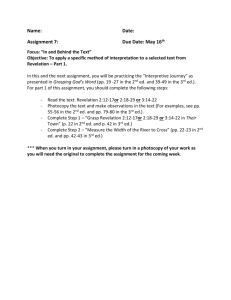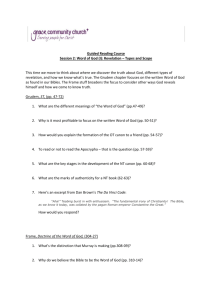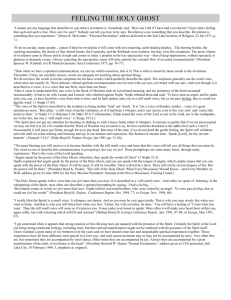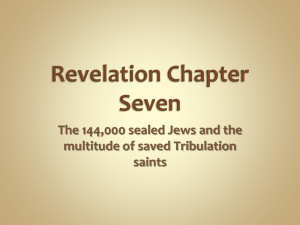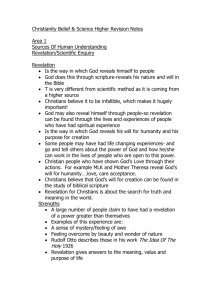File - Living Young Blog
advertisement
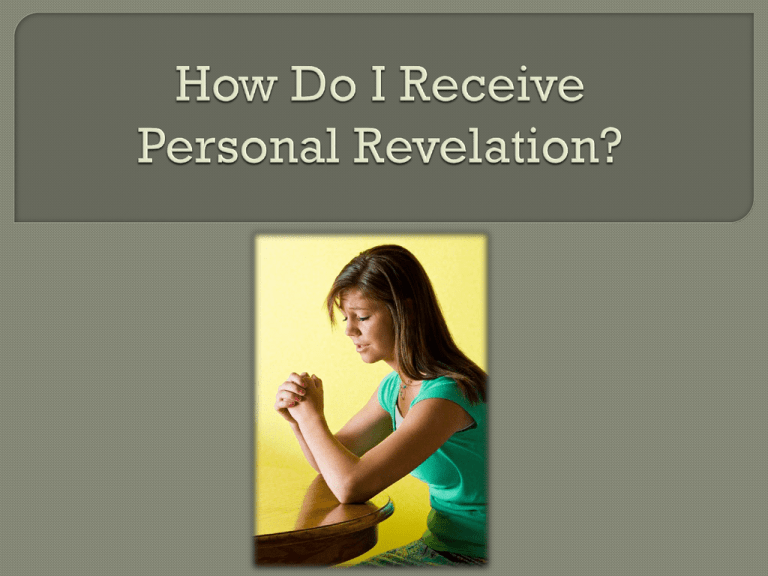
Revelation is communication from God to His children. This guidance comes through various channels according to the needs and circumstances of individuals, families, and the Church as a whole. Prophets are not the only people who can receive revelation. According to your faithfulness, you can receive revelation to help you with your specific needs, responsibilities, and questions and to help you strengthen your testimony. Each of us is entitled to personal revelation to guide our lives. In order to receive personal revelation, we must prepare by living worthily and studying and pondering the scriptures. If we seek and ask, God will reveal His will to us through the Holy Ghost. Pray For Guidance Be Reverent Be Humble Keep The Commandments Partake of the Sacrament worthily Study the Scriptures every day Take Time to Ponder Study it out in your mind Patiently seek God’s Will. Matthew 7:7-8 In order to find and receive, you must seek and ask. If you do not knock—praying to your Heavenly Father for guidance—the door of revelation will not be opened to you. But if you approach your Father in humble prayer, you can eventually “receive revelation upon revelation, knowledge upon knowledge, that thou mayest know the mysteries and peaceable things—that which bringeth joy, that which bringeth life eternal” (D&C 42:61). Reverence is profound respect and love. When you are reverent and peaceful, you invite revelation. Even when everything around you is in commotion, you can have a reverent attitude and be prepared to receive guidance from the Lord. Humility is closely related to reverence. When you are humble, you recognize your dependence on the Lord. The prophet Mormon taught, “Because of meekness and lowliness of heart cometh the visitation of the Holy Ghost, which Comforter filleth with hope and perfect love” (Moroni 8:26). When you keep the commandments, you are prepared to receive, recognize, and follow the promptings of the Holy Ghost. The Lord promised, “Unto him that keepeth my commandments I will give the mysteries of my kingdom, and the same shall be in him a well of living water, springing up unto everlasting life” (D&C 63:23). The sacramental prayers teach how to receive the constant companionship of the Holy Spirit. When you partake of the sacrament, you witness to God that you are willing to take upon yourself the name of His Son and that you will always remember Him and keep His commandments. Heavenly Father promises that when you keep these covenants, you will always have the Spirit to be with you. (See D&C 20:77, 79.) As you diligently study the scriptures, you learn from the examples of men and women whose lives have been blessed as they have followed the Lord’s revealed will. You also become more receptive to the Holy Ghost in your own life. As you read and ponder, you may receive revelation about how a certain scripture passage applies to you or about anything else the Lord desires to communicate to you. Because scripture reading can help you receive personal revelation, you should study the scriptures every day. When you take time to ponder the truths of the gospel, you open your mind and heart to the guiding influence of the Holy Ghost (see 1 Nephi 11:1; D&C 76:19; 138:1–11). Pondering takes your thoughts from the trivial things of the world and brings you closer to the Spirit. At times the Lord’s communication will come only after you have studied a matter out in your own mind. The Lord explained this process to Oliver Cowdery, who served as Joseph Smith’s scribe through much of the translation of the Book of Mormon. But, behold, I say unto you, that you must study it out in your mind; then you must ask me if it be right, and if it is right I will cause that your bosom shall burn within you; therefore, you shall feel that it is right” (D&C 9:7–8). God reveals Himself “in his own time, and in his own way, and according to his own will” (see D&C 88:63–68). Revelation will probably come to you “line upon line, precept upon precept, here a little and there a little” (2 Nephi 28:30; see also Isaiah 28:10; D&C 98:12). Do not try to force spiritual things. Revelation does not come that way. Be patient and trust in the Lord’s timing. The Lord is always here ready to help us. He asks that we make an effort to prepare ourselves to receive revelation. Watch this video and notice the steps these youth took to invite personal revelation into their lives. Amid the many noises and messengers in the world today, you must learn to recognize the whisperings of the Holy Ghost. The following are some of the principal ways the Holy Ghost communicates with us: He speaks to the mind and heart in a still, small voice. The Lord taught: “I will tell you in your mind and in your heart, by the Holy Ghost, which shall come upon you and which shall dwell in your heart. Now, behold, this is the spirit of revelation” (D&C 8:2–3). Sometimes the Holy Ghost will help you understand a gospel truth or give you a prompting that “seems to occupy [your] mind, and press itself upon [your] feelings” (D&C 128:1). Although such revelation can have a powerful effect on you, it almost always comes quietly, as a “still small voice” (see 1 Kings 19:9–12; Helaman 5:30; D&C 85:6). Although we often describe communication from the Spirit as a voice, that voice is one that we feel more than we hear. And while we speak of “listening” to the whisperings of the Holy Ghost, we often describe a spiritual prompting by saying, “I had a feeling …” Note the Lord’s final words in Doctrine and Covenants 9:8: “Therefore, you shall feel that it is right.” The burning described in this scripture passage signifies a feeling of comfort and serenity, not necessarily a sensation of heat. As you continue to seek and follow the Lord’s will in your life, you will come to recognize how the Holy Ghost influences you personally. The Holy Ghost is often called the Comforter (see John 14:26; D&C 39:6). As He reveals the will of the Lord to you, He will “speak peace to your mind” (D&C 6:23). The peace He gives cannot be counterfeited by worldly influences or false teachings. It is the peace the Savior promised when He assured His disciples that He would send the Comforter: “Peace I leave with you, my peace I give unto you: not as the world giveth, give I unto you. Let not your heart be troubled, neither let it be afraid” (John 14:27). Revelations are conveyed in a variety of ways, including, for example, dreams, visions, conversations with heavenly messengers, and inspiration. Some revelations are received immediately and intensely; some are recognized gradually and subtly. Two experiences with light described next will help us to better understand these two basic patterns of revelation. The first experience with light occurs as we enter a dark room and turn on a light switch. In an instant a bright flood of illumination fills the room and causes the darkness to disappear. What previously had been unseen and uncertain becomes clear and recognizable. This experience is characterized by immediate and intense recognition of light. The second experience takes place as we watch night turn into morning. Do you recall the slow and almost imperceptible increase in light on the horizon? In contrast to turning on a light in a dark room, the light from the rising sun does not immediately burst forth. Rather, gradually and steadily the intensity of the light increases. The gradual increase of light radiating from the rising sun is like receiving a message from God “line upon line, precept upon precept” (2 Nephi 28:30). Most frequently, revelation comes in small increments over time and is granted according to our desire, worthiness, and preparation. I have talked with many individuals who question the strength of their personal testimony and underestimate their spiritual capacity because they do not receive frequent, miraculous, or strong impressions [like the flipping of a light switch]. (Elder Bednar) If you have had similar thoughts or doubts, please know that you are quite normal. Just keep pressing forward obediently and with faith in the Savior. As you do so, you “cannot go amiss” (D&C 80:3). In many of the uncertainties & challenges we encounter in our lives, God requires us to do our best, to act & not be acted upon (see 2 Nephi 2:26), & to trust in Him. We may not see angels, hear heavenly voices, or receive overwhelming spiritual impressions. We frequently may press forward hoping & praying—but without absolute assurance—that we are acting in accordance with God’s will. But as we honor our covenants & keep the commandments, as we strive ever more consistently to do good & to become better, we can walk with the confidence that God will guide our steps. And we can speak with the assurance that God will inspire our utterances. This is in part the meaning of the scripture that declares, “Then shall thy confidence wax strong in the presence of God” (D&C 121:45). Elder Bednar As you appropriately seek for and apply unto the spirit of revelation, I promise you will “walk in the light of the Lord” (Isaiah 2:5; 2 Nephi 12:5). Sometimes the spirit of revelation will operate immediately and intensely, other times subtly and gradually, and often so delicately you may not even consciously recognize it. But regardless of the pattern whereby this blessing is received, the light it provides will illuminate and enlarge your soul, enlighten your understanding (see Alma 5:7; 32:28), and direct and protect you and your family. (Elder Bednar)
